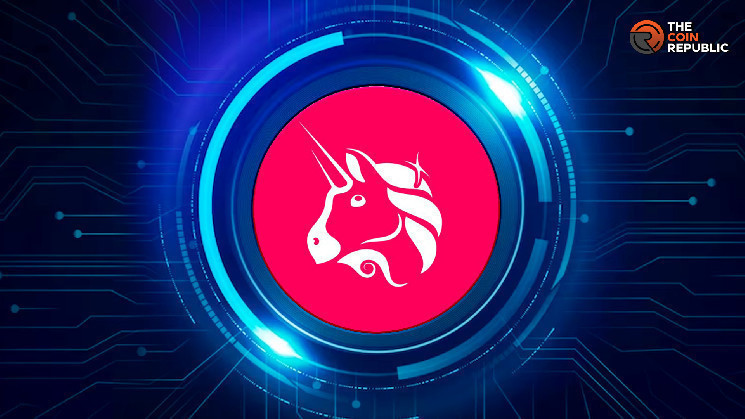
Uniswap (UNI), a leading decentralized finance (DeFi) protocol, recently experienced a remarkable surge in its price, skyrocketing by over 50%. This surge came on the heels of a groundbreaking governance proposal aimed at enhancing the protocol’s decision-making process and incentivizing UNI token holders.
The proposal suggests implementing a fee-sharing mechanism that rewards UNI holders who stake and delegate their tokens, thereby increasing engagement and participation in the governance ecosystem. This significant price gain underscores the market’s positive response to initiatives aimed at strengthening decentralized governance and community involvement within the Uniswap ecosystem.
Uniswap shakes up the DeFi landscape
On Friday, the governance token (UNI) of the decentralized exchange Uniswap increased by as much as 50% in response to a proposal to overhaul the protocol’s governance system put forth by Erin Koen, the governance lead of the Uniswap Foundation.
In addition to “energizing and fortifying” the governance of Uniswap, the proposal would recompense UNI token holders who staked and delegated their tokens.
“I believe we should upgrade the protocol so that its fee mechanism rewards UNI token holders that have staked and delegated their tokens,” Erin Koen stated in a post on X.
🧵 Biggest week in Uniswap Protocol Governance… ever?
I just proposed a large-scale upgrade to the system. Specifically, I believe we should upgrade the protocol so that its fee mechanism rewards UNI token holders that have staked and delegated their tokens. 🦄
— Erin Koen (@eek637) February 23, 2024
In the event that the upgrade is granted approval, UNI token holders who have delegated and staked their tokens will be compensated via its fee mechanism. If the governance supports the initiative, it will be put to a vote.
The largest decentralized exchange in terms of trading volume has witnessed a significant development with Koen’s proposal, which departs from the initiative from the previous year that aimed to compensate token holders with accrued fees.
In June of last year, the Uniswap community rejected a proposal that would have implemented fees for a significant portion of the exchange’s liquidity pools. It allocated a portion of the generated revenue to token holders.
The exchange instituted a 0.15 percent fee on crypto swaps involving ETH, USDC, and other tokens that were initiated through the protocol’s interface in October.
In the event that the community vote on Friday supports the proposed redesign, it would facilitate the programmatic and permissionless collection of protocol fees. The funds would be distributed proportionally to UNI token holders who have placed bets and delegated votes.
UNI market performance
As seen on the liquidations chart, the Uniswap (UNI) price eventually broke consolidation on Friday with an impressive god candle, catching traders off guard.
As of now, UNI was trading at $12, representing a nearly 50% increase over the previous twenty-four hours and its greatest price since April 2022.
In the interim, UNI open interest has skyrocketed to $174.4 million due to the excitement surrounding these prospective offerings, with the Binance exchange leading with $97.2 million, followed by Bybit and OKX exchanges with $40.7 million and $30.5 million, respectively.
In tandem with the increase in open interest, short positions worth up to $3.07 million were liquidated, compared to long positions worth $1.78 million, as the price of Uniswap surged by nearly 50%.
Furthermore, reports suggest that over 500,000 UNI tokens, which were valued at around $3 million at the time, were acquired six hours prior to the public disclosure of the proposal update.
Over 500k ($3m worth) of UNI was bought 6 hours before the news.
If you suck at trading, have you even tried insider trading? pic.twitter.com/JvJA2cGIPR
— adam (@abetrade) February 23, 2024
In addition, the price of UNI may rise another neck in order to reclaim its peak of $12.49 on March 29, 2022. Such an action would result in an increase of 10% over the present levels.
On March 1, 2024, a snapshot ballot will be conducted in support of this proposal, and on March 8, 2024, an on-chain vote will be published.
